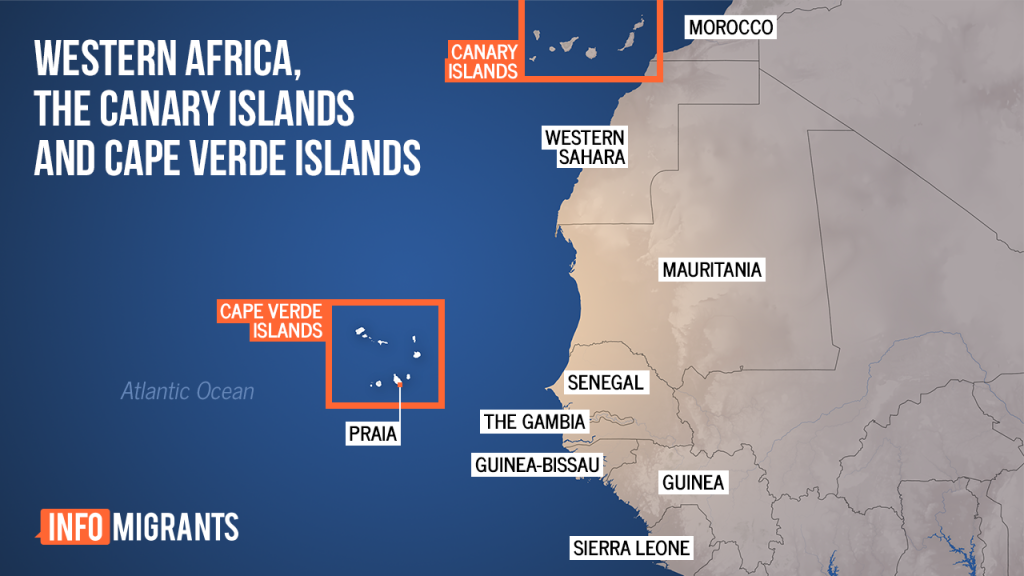A boat carrying mainly Senegalese migrants washed up in the Cape Verde archipelago off West Africa on Sunday night after being adrift at sea for several days. Several hundred more migrants also arrived in the Canary Islands.
Sixty-four Senegalese and two Gambians arrived on Sunday on Sal, an island in the Cape Verde archipelago. They had been traveling in a large canoe called a pirogue. It was unclear how many had been on the boat when it set out, local police chief Orlando Evora told the news agency AFP.
"The police have launched an inquiry to see if the boat was carrying other migrants and to find out what happened onboard," he said.
Evora said six "Senegalese citizens" had walked into Pedra de Luma village on Sunday evening. They had asked for help, explaining that their boat had run aground nearby and saying that other migrants were in need.
At least one victim
The survivors were taken to a local hospital for examination, but only seven were kept for further treatment, according to AFP. Most of the migrants were suffering from exhaustion and one person died several hours later, Evora said.
The migrants have been given shelter in two tents near a sports center in Espargos, the main town on Sal.
A source close to the national coastguard in Senegal said 63 Senegalese had been onboard, according to AFP. They were believed to be from Mbour and Saly, coastal towns about 80 kilometers south of the capital Dakar. The source said two Gambians were also onboard.
"Some people aboard the canoe reportedly did not survive," the source said, without giving further details.
Cape Verde is a former Portuguese colony situated around 500 kilometers from the coast of Senegal.

320 arrived in Canary Islands on Tuesday
Meanwhile Spanish rescue services said on Tuesday that they had found more than 320 migrants in 10 boats off the Canary Islands archipelago. The service said the boats were located off the island of Gran Canaria between midnight and early morning.
All the migrants came from the northwest African countries. They were taken to the Arguineguin dock on the southwestern coast of the island.
There are currently more than 2,000 migrants, many from sub-Saharan countries, at the dock. Some are in Red Cross tents, but many have no shelter. On Tuesday the Spanish news site el país reported that 200 people had been moved from the port "without guarantee of a reception place."
Read also: Protests erupt in Gran Canaria as migrant arrivals soar
Sharp rise in Canary Islands arrivals continues
The Spanish Interior Ministry said in a report this week that 16,760 migrants had arrived by sea on the Canary Islands between January 1 and November 15, a figure that was up by 1,000% compared to the same period last year.
More than half of the total have arrived in the last four weeks. The ministry said the total number of migrant arrivals by boat to Spain was 32,427 for the same period, up 45% from last year.
The Canaries lie more than 100 kilometers from the coast of Africa at their closest point. The sea route is highly dangerous, claiming at least 251 lives between January 1 and September 17, according to the UN migration agency IOM, compared to 210 fatalities for the whole of last year.
In addition to these, the IOM says 140 died in a sinking in October, although this toll is disputed by the Senegalese government.
More than 1,500 migrants have been intercepted in Senegalese waters in recent days, the Senegalese police said last week.
The Atlantic route has been used more and more as the authorities have clamped down on the other main migration route in West Africa, which goes through the Sahara to the Mediterranean coast.
Read also: Senegal mourns those who drowned migrating
With AFP, AP
